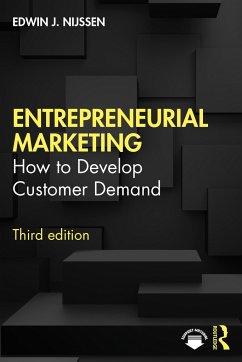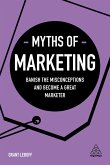How do you sell an innovative product to a market that does not yet exist? Entrepreneurial businesses often create products and services based on radically new technology that have the power to change the marketplace. Existing market research data will be largely irrelevant in these cases, making sales and marketing of innovative new products especially challenging to entrepreneurs. Entrepreneurial Marketing focuses on this challenge.
Classic core marketing concepts, such as segmentation, positioning, and the marketing mix undergo an 'extreme makeover' in the context of innovative products hitting the market. Edwin J. Nijssen stresses principles of affordable loss, experimentation, and adjustment for emerging opportunities, as well as cooperation with first customers. Containing many marketing examples of successful and cutting-edge innovations (including links to websites and videos), useful lists of key issues, and instructions on how to make a one-page marketing plan, Entrepreneurial Marketing provides a vital guide to successfully developing customer demand and a market for innovative new products. This third edition has been thoroughly expanded, including:
Expanded content on leveraging digital technologies and their new business models
More practical tools, such as coverage of the Lean Canvas model
Updated references, cases, and new examples throughout; and,
Updated online resources
This book equips advanced undergraduate and postgraduate students of marketing strategy, entrepreneurial marketing, and entrepreneurship with the fundamental tools to succeed in marketing.
Classic core marketing concepts, such as segmentation, positioning, and the marketing mix undergo an 'extreme makeover' in the context of innovative products hitting the market. Edwin J. Nijssen stresses principles of affordable loss, experimentation, and adjustment for emerging opportunities, as well as cooperation with first customers. Containing many marketing examples of successful and cutting-edge innovations (including links to websites and videos), useful lists of key issues, and instructions on how to make a one-page marketing plan, Entrepreneurial Marketing provides a vital guide to successfully developing customer demand and a market for innovative new products. This third edition has been thoroughly expanded, including:
Expanded content on leveraging digital technologies and their new business models
More practical tools, such as coverage of the Lean Canvas model
Updated references, cases, and new examples throughout; and,
Updated online resources
This book equips advanced undergraduate and postgraduate students of marketing strategy, entrepreneurial marketing, and entrepreneurship with the fundamental tools to succeed in marketing.
'As a way to augment the "core principles" when teaching marketing this is a useful text. I believe the (relatively) static dimensions of segmentation, positioning and marketing mix for FMCGs and other consumer products can be usefully built upon for specialist cohorts using this text.'
Rebecca Payne, Head of Land and Agribusiness Management, Harper Adams University, UK
'Marketing for Entrepreneurs requires a very different approach to established businesses. This is under appreciated and the assumptions can result in failure. This is the why Nijssen's book is so important. He takes the work of Steve Blank to the next stage in terms of providing the marketing tools and approaches that take the start-up through the customer discovery to validation and growth. I use it in both my Master Entrepreneurship programmes and in working with start-ups.'
Mark Copsey, Course Leader MSc Entrepreneurship and Business Development, Leeds Beckett University, UK
Rebecca Payne, Head of Land and Agribusiness Management, Harper Adams University, UK
'Marketing for Entrepreneurs requires a very different approach to established businesses. This is under appreciated and the assumptions can result in failure. This is the why Nijssen's book is so important. He takes the work of Steve Blank to the next stage in terms of providing the marketing tools and approaches that take the start-up through the customer discovery to validation and growth. I use it in both my Master Entrepreneurship programmes and in working with start-ups.'
Mark Copsey, Course Leader MSc Entrepreneurship and Business Development, Leeds Beckett University, UK








